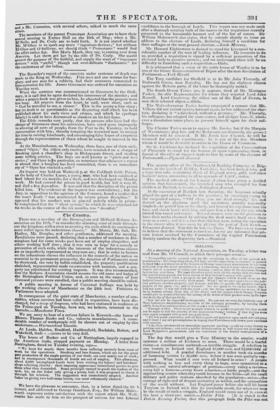The Recorder's report of the convicts under sentence of death
was made to the King on Wednesday. Five men and one woman for burs lary and one man for a robbery, had their sentences commuted to g transportation for life. James Greenacre was ordered for execution on Tuesday next.
When the sentence was communicated to Greenacre by the Ordi- nary, it is said that he again declared his innocence of the murder ; and when a prayer-book was given to him, he objected that the prayers were too long. All prayers from the heart, he said, were short, such as " God be merciful to me, a sinner." This is the penny-a-line story ; but its truth is as questionable as the disgusting stuff which has been published about his early vices and crimes, and which he (perhaps falsely) is said to have denounced as slanders on his fair fame.
The Globe remarks very justly, that the persons who have had the charge of Greenacre since his conviction, have acted most improperly in allowing all sorts of people, from the Peer to the Turnkey, to hold conversation with him ; thereby tempting the wretched man to occupy his time in coining falsehoods, and encouraging false hopes of a reprieve through the representation of those whom he sought to interest in his fate.
At the Mansionhouse, on Wednesday, three boys, one of them nick- named "Ogee," the eldest only twelve, were remanded on a charge of breaking open a chandler's shop in Bishopsgate Street, and stealing some trifling articles. The boys are well known as "pitch and toss covies ;" and Ogee islin particular, so notorious that whenever a report is abroad that a burglary has been committed, there is an immediate cry of " Ogee has cracked a crib."
An inquest was held on Wednesch y, at the Coldbath fields Prison, on the body of Charles Lucas, a young man, who had been confined at hard labour for six months, for a theft, and was discharged on Monday week. He had entered the prison in good health, but left it very ill, and (lied a few days after. It was said that the discipline of the prison killed him. The evidence at the inquest was contradictory ; but the Jury, in opposition to the opinion of the Coroner, found a verdict that the man's death " was accelerated by severe prison discipline." It appeared that his conduct was in general orderly while in prison : be complained that the " silent system," to which he was subjected for six weeks in the course of the six months, was "dreadful."


























 Previous page
Previous page